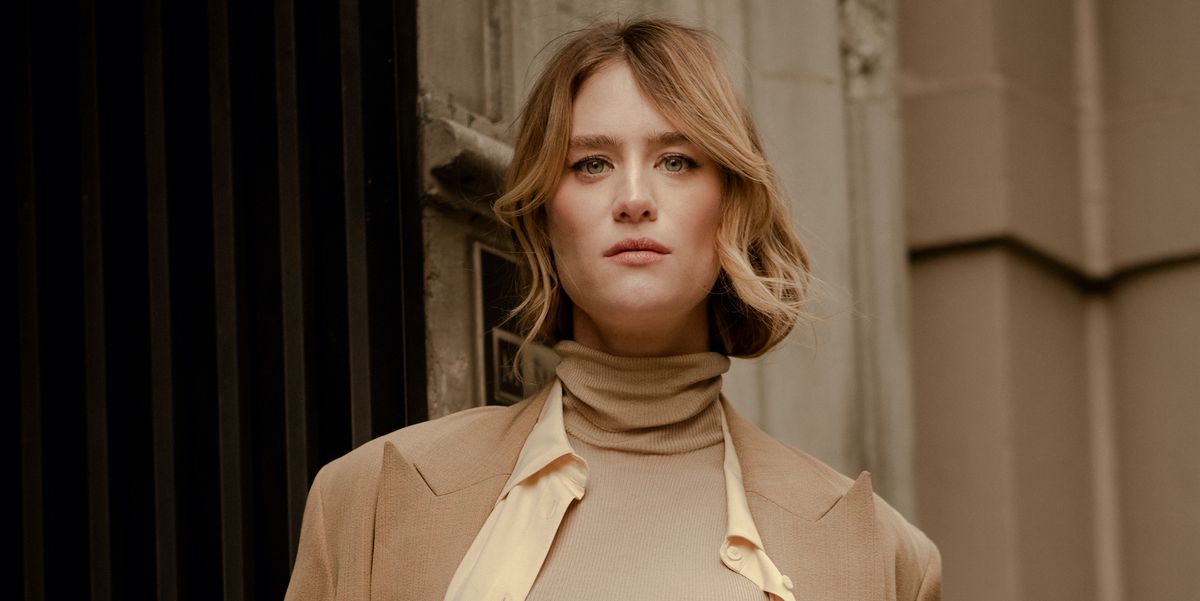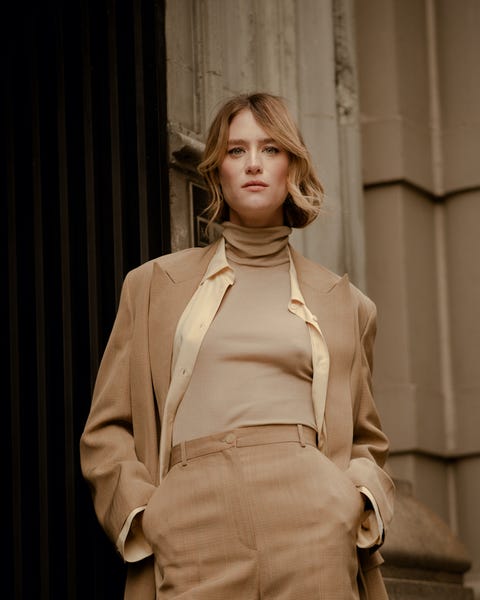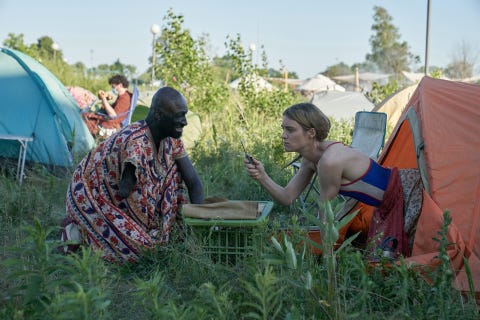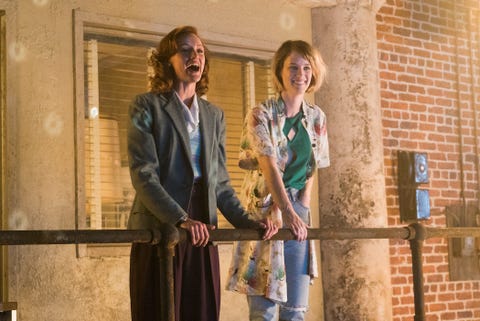If it were really, truly the end of the world, and Mackenzie Davis knew it, she’d be in Canada. Just north of Vancouver, to be precise—her childhood home. If Earth were about to burn, Davis would prefer it be summertime, because then she could steer her father’s wooden boat out into the waters of Desolation Sound, a popular sailing spot off the Salish Sea. There, the light streams out from behind the mountains in the distance, turning the coast a cool violet. With all her friends and family piled into her dad’s old boat—this is fantasy, after all, there’d be enough room—they’d fish for prawns in the morning and behead them in the afternoon, with Davis dipping her long, muscular body between the rocks, coming up for air with armfuls of oysters. This would be, Davis says, the happiest apocalypse she can imagine.
Lately, the 34-year-old actress has spent a lot of time thinking about endings. That’s not to say she’s a particularly morbid person. In fact, she’s often quick-witted, even wry; our first exchange is over a dirty joke I’ve declined to share here. But a couple of years like 2020 and 2021 demand a real honesty about the nature of life and death. “Everything changed,” Davis tells me, as we lounge in a perfect pandemic-era tableau, both of us unmasked but carefully contained within a tiny room at her publicist’s offices in Manhattan. “We’re just pretending that it’s fine because we can go out for dinner again.”
It’s not fine, actually, and Davis knows this, though she hesitates with how to articulate it. Repeatedly throughout our conversation, she cuts in with short, blunt laughs, as if catching herself in an embarrassing act. She apologizes more than once for being “such a bummer,” but the worry is misplaced; nothing about our chat is depressing. Like the project that spurred this interview, everything Davis says, rather, is imbued with a surreal sort of glow. It’s perhaps what her good friend and Black Mirror co-star Gugu Mbatha-Raw calls her “cool girl quality.”
Station Eleven, the new HBO Max miniseries in which Davis stars, puts this quality to work, to mesmerizing effect. Based on the book of the same name by Emily St. John Mandel, the show is about a pandemic, though one much more destructive than the coronavirus. By the year 2040, the fictional Georgia Flu has wiped out 99 percent of humanity, leaving only small bands of survivors living in tents, rusted-out cars, and the hollowed bellies of Wal-Marts, gas stations, and, in one particularly intriguing case, the Severn City Airport. But unlike most dystopian futures, the world of Station Eleven is profuse with color and sound; its old world remains are not forgotten relics but reinvented tools. The characters dress in scavenged skirts; they play lovingly repaired instruments; they hitch horses to dusty hatchbacks.
Davis’s character, Kirsten Raymonde, is one of a dwindling number of people who remember the so-called “before” or “pre-pan,” when electricity and internet and airplanes made the effort of surviving an afterthought. As a member of the Traveling Symphony, a Shakespearean theater troupe and orchestra that criss-crosses the Great Lakes Region every year, Kirsten channels her own traumas into celebrated performances as, say, Hamlet or Titania. But she is nevertheless haunted by her memories of the first year of the pandemic, in which so many perished, including her parents, a good friend, and—she suspects—the man who saved her life, Jeevan Chaudhary (Himesh Patel).
Over the course of the 10 episodes, Kirsten is haunted by refrains from the graphic novel she carries with her, also called Station Eleven, which she was gifted by the actor Arthur Leander (Gael García Bernal), a Brad Pitt-level superstar who dies before the Georgia Flu overtakes the world. These phrases turn over in her mind until they become vaguely Biblical, both sanctified and eerie in their prescience: “I remember damage.” “There is no before.” “To the monsters, we’re the monsters.”
Through both the events of the series and the characters she encounters, Kirsten wrestles with the competing desires to excise her traumas and hold fast to old tethers. She loves ferociously, but has lost too much to love recklessly. She’s found a new home, but one that’s always moving, never fixed in time or space. She remembers her early days, hunkered down in a Chicago apartment with Jeevan and his brother, but isn’t sure she wants to. Davis is reluctant to compare her own experiences to Kirsten’s—she considers herself, somewhat self-mockingly, a “very privileged little girl”—but relates to the character’s internal battle. Healing isn’t particularly attractive when it requires you confront the very thing that broke you. Better to trust your instinct; better to run.
Davis doesn’t go into detail about what happened to her at the start of lockdown, though she doesn’t need to; it mirrors what so many others also experienced. Suffice to say, there was a breakup, then a long period of isolation that resulted in a desperate need for movement. She read The Invisible Man and The Grapes of Wrath. By the time she spoke with friend and Tully co-star Charlize Theron for a chat published in Interview last December, she’d transplanted her life to London: “Well, baby,” she told Theron, “2020 has been my year of big fucking jumps.”
After widely praised turns in the AMC drama Halt and Catch Fire, the Theron-led Tully, and a mega-franchise appearance in Terminator: Dark Fate, Davis’s career seemed ready to ignite by the time the coronavirus made landfall in the States, where Davis was preparing to film Station Eleven. Now, abruptly, she was adrift.
As a child, Davis craved the spectacle of performance, the indulgence of being watched; but as a teenager, she became more withdrawn in her process. She started attending weeknight acting classes where she was the only 13-year-old in the room, and performing became “this sacred, cool thing that you do under the cloak of night,” Davis says. Still, it wasn’t until after she’d earned degrees in English literature and women’s studies from McGill University in Montreal that she finally hurled herself at full-time acting—the kind that, ideally, would make her some money. In New York, she went to theater school at the Neighborhood Playhouse, then moved to Los Angeles for her screen debut, first in the 2013 film Breathe In and later in Halt and Catch Fire.
Few watching Halt would have guessed Davis was a newcomer. She exuded confidence in her role as the capricious coder Cameron Howe, whom she analyzed (and protected) religiously. Recalls Davis’s co-star Lee Pace, who played her love interest, Joe MacMillan, “I remember being struck by her intelligence…You get that freshness that she brought to the character once in your career. Everyone was into what she was doing, and she was so into it. Like, she took it really seriously and really embraced the responsibility she had on the show and the making of a three-dimensional woman out of that character.”
What Pace describes as her “intelligence,” Davis would perhaps describe as her “ease.” From the beginning, acting was easy in a way that unsettled her. She didn’t think she’d earned this skill, or, really, much of anything that had happened in her life. She still thought of herself as an extraordinarily lucky young thing from Vancouver, an attractive, if gangly, white woman from a wealthy part of the world with two loving parents—co-founders of the Vancouver-based hair care company AG Hair—and a boat she could ride into Desolation Sound. “I felt like, to be a whole person, you needed to suffer more, that things should be hard,” she says. “My parents had really colorful lives, building their careers and their relationships. And I grew up with the stories of their exploits and how they got to be the people they were. And I always worried that if things were too easy, maybe—I don’t know—I wouldn’t have the stuff that makes a strong person.”
Now, Davis recognizes this logic as privileged, or at least misguided. It’s not suffering itself that manifests strength; it’s the willingness to parse that suffering, to confront the dark contours of the world and still nurture some hope. Kirsten discovers this as a member of the Symphony, perpetually plumbing her old aches for art’s sake; Davis understood it best on the set of Station Eleven.
When the production shut down in early 2020, Davis had a friend living with her in Los Angeles. Like everyone else in the world, they were terrified—and transfixed—by the sudden swath of time that confronted them. What they did have were the first six scripts for Station Eleven. In a fit of manic creativity, they shot every single one of Davis’ scenes as a monologue, just Davis in front of a camera, acting out her lines around her home and the woods surrounding it. Any time the script called for a line from another actor, the footage would cut to a b-roll shot of nature: crumpled leaves, bent sticks, birds floating from one tree limb to another. “It was a funny lead-up into shooting the show, to do this practice run of what it was like to do it at the time that we should have done it,” Davis says.
But once she was actually in Toronto for production in January 2021, the accumulated weight of the past year crept in. Due to the nature of the work—a heavy, emotional tale about the long tail of an apocalypse—she could no longer lean into storytelling as a distraction. It was cold in Toronto, poor incentive for sight-seeing, and, anyway, the actors weren’t allowed to explore, nor could they host friends or other actors at their apartments. They went to work, expunged their traumas for the sake of good fiction, then trudged back to what Davis called their “isolation chambers.”
“It felt like so much of the last year was feeling an amorphous grief and not knowing where to put it,” Davis says. “And it felt like the show made a house that we all got to put our grief into. And so it was quite sad for me. It wasn’t light, and it wasn’t—it wasn’t not hopeful, but the show was full of—” Here, she stumbles, then restarts. “I really want to market [the show] well, but it was heavy for me.”
I’m wary to push here, knowing Davis’s feelings about intrusion. (She once told Mbatha-Raw, “I hate it when someone interviews me—I bristle at the psychoanalysis that goes into finding patterns in my work. I don’t know why I do things.”) But, as she ties her hair into a loose knot at the base of her neck, I press, gently: It’s obvious, by this point in the interview, that she experienced something profound while filming the show. So, what was it, exactly?
She takes a big breath, then a lengthy pause. “The last year has been a very thoughtful time in my life, and Station Eleven was a big part of that reflection and also time in aloneness to think about who I was, what I was doing, what it felt like to be in my body,” she says. “It’s been quite a sad year, honestly. But I feel like my fever just broke, in a weird way…I do feel like I woke up from a long sleep.”
There’s a scene in one of the later episodes of Station Eleven, where Davis lurks near the periphery of a flashback involving her younger self (Matilda Lawler) and Patel’s Jeevan. She says little, operating instead as a detached observer of the moments that transformed her from innocent child to post-pan survivor. Davis “was just a ghost in the corner, and she sort of said [once], ‘I like watching you work,’” Patel tells me. “I was like, ‘Oh thanks. That’s very kind of you.’ But I kind of realized, that is largely what she was doing.”
Many years past her teenage acting classes, Davis still relishes these moments of quiet intimacy, these opportunities to absorb information. As Mbatha-Raw tells me, Davis has “a really curious mind. She’s interested in a lot of things; she’s well-traveled…which I think she brings to every role.” Davis’s favorite filming experience to date was on the set of Always Shine, the 2016 indie thriller she made with director Sophia Takal. The small cast lived together in a house in Big Sur, where they spent all day talking and experimenting and working out the kinks of their approach. “It most closely replicated acting before it was a career,” Davis says. “And I always feel like that’s the thing I’m trying to find again.”
Always Shine also helped her realize acting didn’t need to be inherently rigorous to be rewarding. She didn’t need a “method.” “It’s good when you just understand something,” she says. “You don’t need to build a whole workshop around it to prove that you’re doing the work of a professional. It’s okay if you just slip into something.”
On the set of Station Eleven, she learned to regard this “slipping in” as an actor’s instinct, which showrunner Patrick Somerville likened to Kirsten’s own aptitude for survival—how she could hear a branch snap in the dark, throw a knife, and kill on impact. Davis loved this description of acting as something serious, even urgent. She’s spent much of her life fighting against her own insecurity that what she does and thinks is invalidated, either by her own lack of experience or by the luxuries of her profession. “For a long time, I was like, [acting] is not serious like other things,” she says. “And it’s not serious like other things; it’s playing make-believe. It’s not that it’s important. It feels important when you’re doing it, and that’s what makes it special.”
The irony, of course, is that a worthy counterpoint to Davis’s argument is her own work. Station Eleven is a show about the power of art—arguably, about the importance of art. “Survival is insufficient,” reads the mantra of the Traveling Symphony, which is to say: We need more than food, water, and shelter. We need something that makes survival worth the damage.
“Art keeps us alive—it’s quite hollow to say that as a one-off,” Davis says. “But, in practice, I think that’s what many of us felt during the pandemic: We missed going to see a movie or a play together, dancing together, having these intangible expressions of joy, grief, sex, or ecstasy or loneliness, and doing it together. I think that’s the hope and earnestness the show and the book articulate.” She allows, finally, some of her own earnestness: “And I love that. I think it’s really beautiful.”




